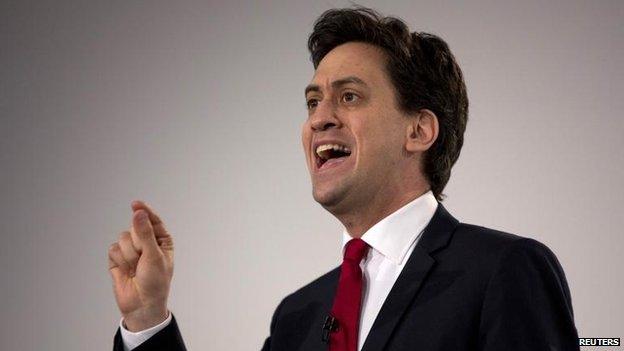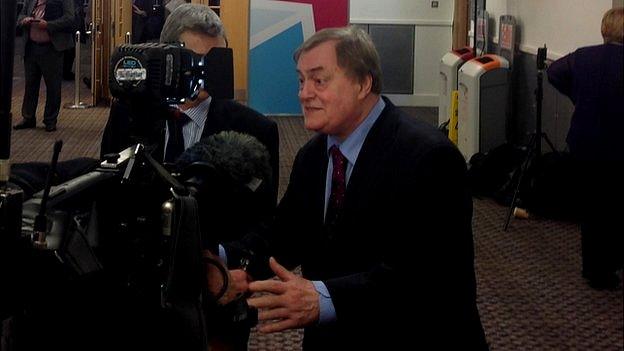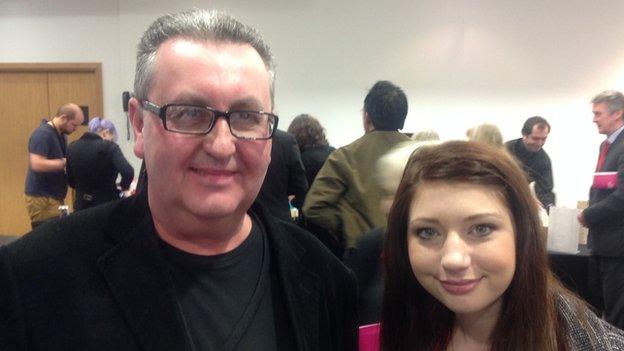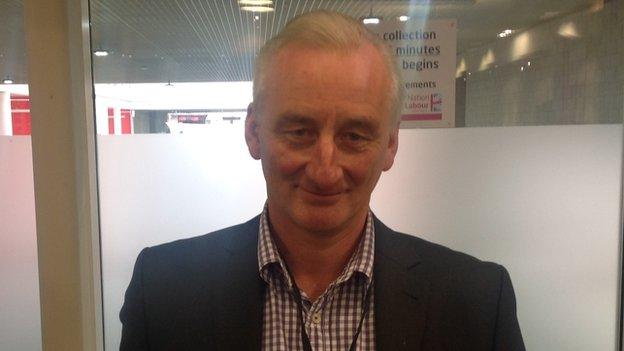Labour's new politics?
- Published

Ed Miliband praised his party's "courage to change" after they approved his reforms by 86.29% in favour
Ed Miliband got the result he wanted at his special one-day conference - the overwhelming backing of party members for his shake-up of Labour's links with the unions. So how do members view the changes?
There was almost a party atmosphere on the rail replacement bus (how many times do you get to write that sentence in your life?) ferrying the Labour tribes to London's ExCel Centre on Saturday morning.
The Docklands Light Railway, that powerful symbol of Thatcherite free market enterprise, was on the blink.
So everyone had to travel the final couple of miles to the conference centre in a more traditional fashion.
It was already turning into a grand day out for the party faithful.
This conference may go down as Ed Miliband's "Clause 4 Moment" - the point at which he took on his party and won reforms that made it electable again.
He certainly wants us to think that.

Labour grandee John Prescott backed Mr Miliband's reforms, saying they would bring "big change"
But former leader Tony Blair had to bludgeon Labour into submission, with the aide of a John-Prescott-shaped battering ram, to get them to scrap their historic commitment to public ownership.
The party members that were gathered here on Saturday morning needed very little persuasion to sign up to Mr Miliband's trade union reforms.
Shadow leader of the House Angela Eagle, who was chairing the debate, even asked at one point if anyone wanted to speak out against the proposals. A few hands went up in the air.
But speaker after speaker backed the plans.
They would be only too happy to welcome a willing army of eager trade unionists to help with the grind of stuffing envelopes and knocking on doors.
"Let's share the love with our supporters," said one, to laughter from the hall. They all know just how boring and unglamorous politics can sometimes be at the grassroots level.
They eagerly endorsed Mr Miliband's suggestion that party members - ie themselves, the very people who had shelled out train fares and hired buses to get here - are not really "normal".
Labour politics has to be thrown open to a much broader cross-section of people, they agreed, or at least to the thousands of "ordinary workers" who might be willing to pay a £3 affiliation fee.

Care worker Gary Ransford and fellow party member Louisa walker travelled to London from Bolsover
Some delegates seemed a bit bemused as to why they were there at all, other than to show their support for Mr Miliband.
"Nobody has ever said to me on the doorstep I think you need to change the rules on the trade unions," said Gary Ransford, a 53-year-old care worker who had travelled down from Bolsover in Derbyshire with his step-daughter and fellow Labour member Louisa.
"We were always going to come and support him because he is on track to win the next election. But I don't really think it was needed. We could have had a postal ballot.
"It has all come about because of Falkirk."
For others, Mr Miliband's proposal to change to "one member, one vote" was a necessary bit of housekeeping that should have have happened years ago.
"I don't think it's going to win any extra votes for us but we have to get our internal party mechanisms right," said Tim McPherson from Bexhill and Battle in East Sussex.
"It is shooting a fox."
The change to union affiliation rules was probably more contentious. Some local party members fear it could fatally weaken Labour's links with unions.

Tim McPherson said the policy wasn't going to win any extra votes but it was vital to get the internal party mechanisms right
They don't like the idea of handing the right to vote in leadership elections to people who have not paid £45 to become full members.
But if the big union leaders shared their concern they did not show it.
Only the plucky little National Association of Master Bakers voiced any real dissent by voting against the changes.
Unite's Len McCluskey backed the reforms but also launched into a blistering tirade against the police investigation into Falkirk vote-rigging allegations.
"My union has done nothing wrong," he thundered, and if anyone doubted that these reforms would spell the beginning of the end for Labour's trade union links, he added: "This is our party and we are going nowhere."
Mr McCluskey has said his union - Labour's biggest financial backer - has some big decisions to make about its future financial relationship with the party.
So although today's result was never in doubt - and was carried by an overwhelming majority of 86% to 14% - there is much old-school horse trading and negotiation to come before Mr Miliband gets the new politics he wants.
- Published4 February 2014
- Published1 March 2014
- Published1 March 2014
- Published4 February 2014
- Published1 March 2014